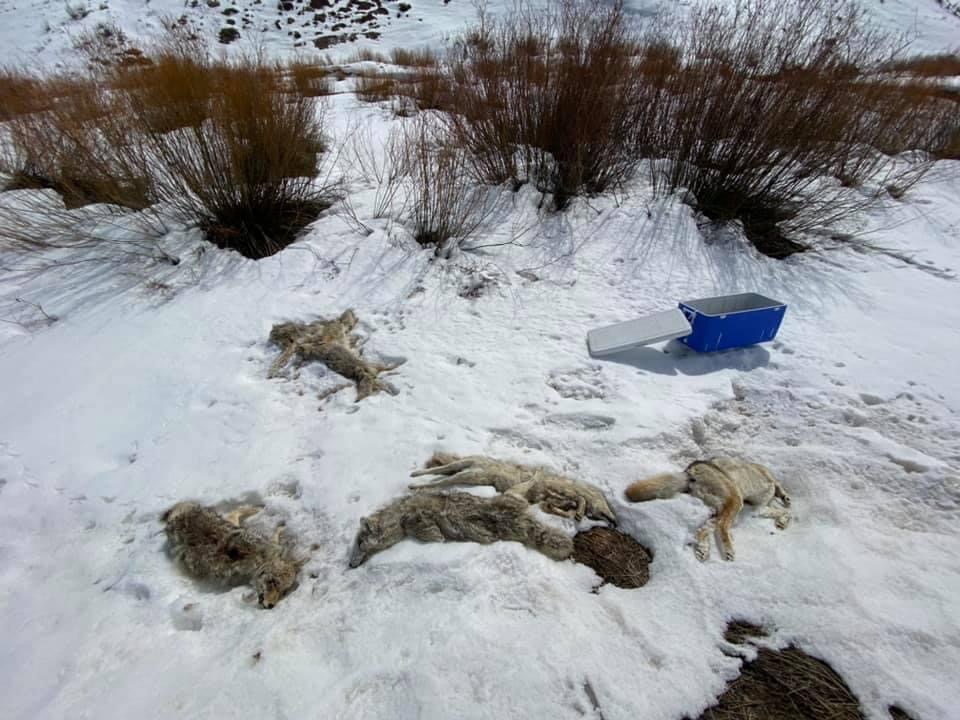Jackson family finds disturbing coyote dump near Salt Creek Pass
Jackson photographer David Stubbs wrote on Facebook this week that he’s “ashamed to live in a state” where killing coyotes and leaving them to waste is legal. After Stubbs reported this scene he encountered south of Afton on a family road trip, a Wyoming Game and Fish Department warden visited the site and removed the animals, but reported no sign of wrongdoing.
COURTESY/DAVID STUBBS
A Jackson family’s road trip south to the desert was interrupted this week by a sight that left photographer David Stubbs repulsed and angry.
Stubbs, his wife, kids and pooch were cruising down Highway 89 on the south side of Salt Creek Pass south of Afton when they stopped at a roadside pull-off to stretch their legs. Opposite the snowbank they stumbled upon numerous dead coyotes, along with an open cooler, some packages of butchered game meat and an animal’s rib cage. Surveying the scene, the longtime Jackson resident initially surmised that the canines had been poisoned, which investigators later ruled out.
“It was a pretty intense sight,” Stubbs told the Jackson Hole Daily. “Especially being with my kids. I’ve worked in news, and I’ve seen my share of dead humans, but this was heavy. It was gnarly.”
The canines’ carcasses were mostly intact with their pelts remaining, and they showed no signs of having been utilized.
Stubbs said his daughters were “freaked out” and saddened.
“They were like, ‘Why would someone ever do that?’ ” he said.
Calling in what he saw to the Wyoming Game and Fish Department, Stubbs was told by a receptionist that coyotes are considered a “predator” species outside of the agency’s jurisdiction, and that they could be legally killed by any means possible.
“I’m a realist,” Stubbs said. “I understand that livestock interests throughout the Greater Yellowstone often determine policy. I don’t know how you change that, it’s an ingrained mentality.
“But what I saw, to me, that’s just cruelty,” he said.
The Stubbs family’s reaction was illustrative of a clash of values between people who see coyotes as an animal that deserves to be managed with rules like any other wildlife species, and an “Old West” viewpoint that predators are better off dead — regardless of how it’s accomplished.
Stubbs’ report resulted in a Wyoming Game and Fish warden taking a drive the same day to check out the area.
The law enforcement officer tallied nine dead coyotes in varying states of decay, a couple of decomposed mule deer that may have been road-killed, plus the cooler that contained three packages of meat and a rib cage. Although it was a strange and gruesome sight, at least initially the officer saw no signs of wrongdoing, Game and Fish spokesman Mark Gocke said.
“I can see how, if you walked up on that scene, what would go through your head, and why you would think poisoning,” he said. “But based on our findings, it didn’t add up to wildlife poisoning.”
Seven of the coyotes had gunshot wounds, an investigation found, and some of the meat had been eaten on by birds — yet no dead birds were nearby. Although poisoning coyotes can be legal in Wyoming, the practice could run afoul of the law if the toxins kill other game species or migratory birds like ravens. The warden removed the cooler, meat and carcasses, Gocke said.
Game and Fish said the site has a history of being a popular place to dispose of animal carcasses. Although dumping dead coyotes off a highway shoulder might be legal in Wyoming, littering a cooler on the landscape would not be. And the rib cage — if it were from a game animal like a deer, that would be illegal, too. Because of the risk of spreading chronic wasting disease, state regulations prohibit disposing of spinal columns outside of approved landfills or incinerators.
Contact Mike Koshmrl at 732-7067 or env@jhnewsandguide.com.



